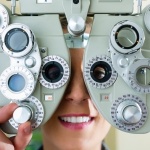Your Eye Health – Concern for Aging Adults
As my patients reach their golden years, they often ask what they can do to protect their eyesight. There are easy steps you can take to help your vision remain healthy, and at the top of the list — seeing your optometrist regularly.
Many eye diseases develop without any obvious symptoms and can aggressively attack your eye health without you noticing. In addition, health problems affecting other parts of your body can affect your eyesight. People with diabetes or high blood pressure, or those taking medications that have eye-related side effects, are at greatest risk for developing vision problems.
Eye diseases that often lurk among adults 50 and older include age-related macular degeneration (AMD), cataracts, diabetic retinopathy, and glaucoma. Dry eye is another common and often chronic condition, which can particularly affect women during menopause.
So what can you do to help keep your eyes healthy?
Eating a low-fat diet rich in green, leafy vegetables and fish, not smoking, monitoring blood pressure levels, exercising regularly and wearing proper sunglasses to protect eyes from UV rays can all play a role in preserving your eye health.
There are also simple lifestyle tweaks you can make to ease strain on your eyes.
- Control glare: Purchase translucent lamp shades, install light-filtering window blinds or shades, use matte or flat finishes for walls and countertops and relocate the television to where it does not reflect glare.
- Decorate with throw rugs, light switches and telephones that are different colors so they can be spotted quickly and easily.
- Install clocks, thermometers and timers with large block letters.
- Increase font size on mobile devices and adjust the screen’s brightness.
- Stay safe while driving: Wear quality sunglasses for daytime driving and use anti-reflective lenses to reduce headlight glare. Limit driving at dusk, dawn or at night if seeing under low light is difficult.
If you have already experienced visual spatial imbalance, visual memory loss and/or vision loss, your doctor of optometry can help plan a rehabilitation program so that you can live and work as independently as possible. Your doctor of optometry may prescribe:
- Optometric Vision Therapy: – OVT can help improve binocular and visual thinking skills that allow you to participate in more activities requiring good balance and good memory.
- Spectacle-mounted magnifiers — A magnifying lens is mounted in spectacles (this type of system is called a microscope) or on a special headband. This allows use of both hands to complete close-up tasks.
- Hand-held or spectacle-mounted telescopes — These miniature telescopes are useful for seeing longer distances and can also be modified for near (reading) tasks.
- Hand-held and stand magnifiers — These are convenient for short-term reading of things such as price tags, labels, and instrument dials.
- Video magnification — Table-top (closed-circuit television) or head-mounted systems enlarge reading material on a video display. Some systems can be used for distance views tasks. These are portable systems, and those that can be used with a computer or monitor. Image brightness, image size, contrast, and foreground/background color and illumination can be customized.
When you make your optometrist a key member of your health care team, you can help prevent the onset of vision loss and enjoy years of healthy eyesight.
By: Dr. Brenda Montecalvo, chair of the American Optometric Association’s Vision Rehabilitation Section
For more information about seniors and eye health, visit aoa.org. Your Eye Health – Concern for Aging Adults
Category: Articles




































